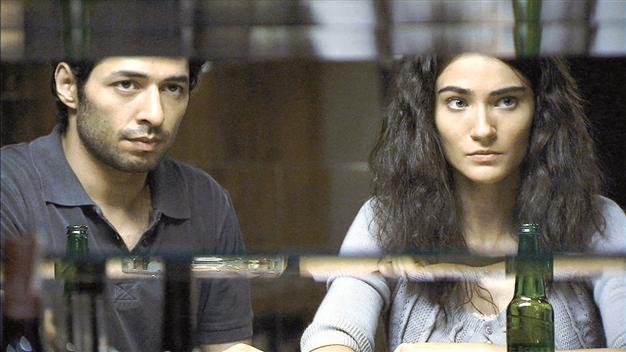Not such a wonderful life for the disabled on screen
EMRAH GÜLER ANKARA - Hürriyet Daily News

A well-written leading character with a disability is often a hot ticket to Oscar nomination for Hollywood actors. But in Turkish cinema, there are only a few that come to mind, the major one being ‘Başka Dilde Aşk’ .
Blame Hollywood for underrepresenting and pigeonholing any kind of minority (that is anyone other than your average white male) throughout its history. But despite its notoriously troubled representation of an accurate demographic profile, Hollywood has not been shy to include disabled characters in some of its major productions as early as 1940s, even earlier.Two classics from 1946 see major characters in some form of disability. In “It’s a Wonderful Life,” we watch James Stewart’s George as a character who has lost his hearing, while another character is in wheelchair. “The Best of Years of Our Lives,” another optimistic title from the same year, is one of the Hollywood pioneers on the haunting effects of war. Here, veterans of World War II are at the backbone of the story, and we relate to Harold Russell’s character struggle after having lost both hands. Dealing with the tolls of war in a movie is a Hollywood sure bet, and even a surer bet for its Oscar contention.
Ten years apart, two films featuring Vietnam veterans with spinal cord injury were the Oscar favorites, with 1978’s “Coming Home” bringing Oscars to its leading actor Jon Voight and leading actress Jane Fonda, and 1989’s “Born on the Fourth of July” bringing Oliver Stone a Best Director Oscar.
A well-written leading character with a disability is often a hot ticket to Oscar nomination for Hollywood actors. Think Sean Penn’s character with developmental problems in “I am Sam,” or British author Iris Murdoch’s battle with Alzheimer’s in “Iris” landing an Oscar nomination both for Kate Winslet and Judi Dench.
Autism in “Rain Man,” hearing impairment in “Children of a Lesser God,” cerebral palsy in “My Left Foot,” developmental disability and spinal cord injury in “Forrest Gump” and schizophrenia in “A Beautiful Mind” are some examples that have led its leading characters to Oscar nominations, and wins in most cases.
This week, we celebrate Disability Awareness Week in Turkey, and it would be nice to conjure some names from Turkish cinema that have featured leading characters with disabilities with an accurate representation. It would be nice, but not that easy. There was a period in Turkish cinema when it was common for one of the leading characters to become disabled after freak accidents, only to be cured miraculously. Disability was a source of agitation or punishment.
Miraculous healing in Turkish TV shows
What about the last two decades when Turkish cinema blossomed from a long period of hibernation, making the rounds in major international festivals, and coming home with awards quite often? There are only a few that come to mind, the major one being the 2009’s “Başka Dilde Aşk” (Love in Another Language), director İlksen Başarır’s debut feature that vowed the audience and critics upon its release.
The film was an against-the-grain, ironic take on a love story in which a young deaf man finds himself in a sweeping romance with a woman working in a call center. Another one is the upcoming “Özür Dilerim” (literal translation is “Excuse Me,” with a pun on the word disability), a feature that was screened and competed in this year’s Istanbul International Film Festival. The film sees renowned actor Güven Kıraç as the film’s producer and its leading actor as a man with a mental disorder. In a recent interview, Kıraç said, “It was more challenging to portray a disabled character than to produce the film.”
What about the TV shows by the dozen, which are higher in popularity when compared to feature films in Turkey? One TV viewer in wheelchair sites the now-canceled show “Bu Kalp Seni Unutur Mu?” as one of the shows that featured a disabled character in one of the leading roles. Or more like a character that became disabled after a traffic accident, and healed miraculously a few episodes later.
‘Ridiculous storylines’
“If you are a disabled person, you see how ridiculous the storylines are,” says Demet. “What the doctors are saying, how the character is healed is all bogus, big lies. It’s like the old Turkish movies in which the blind woman suddenly is able to see after a traffic accident. Decades later, it’s still the same, as if there’s a magic wand and everyone is all right with that wand.” Demet said the man becomes disabled to serve as a punishment for his wife in the storyline. “She cheated on him, and now she has to look after him.”
“Many TV shows confine the characters to wheelchairs just to heat up the plot,” said Demet. “Only to make them play basketball a few episodes later.” There are, however, some shows that breathe life to its disabled characters, according to Demet. “Yol Arkadaşım” (My Road Buddy), “Arka Sıradakiler” (Those in the Back Row) and “Benim İçin Üzülme” (Don’t You Feel Sorry for Me) are a few of those.
“Benim İçin Üzülme” is especially noteworthy as one of the leading characters is both mentally and physically disabled. Yet, he is one of the more well-rounded characters in the show. In fact, a Google search of the actor completes the sentence to “Is Ahmet Varlı really disabled?” It’s no excuse, but when even the nondisabled characters are cardboard characters, it’s a bit much yet to expect three-dimensional disabled characters on Turkish TV.
















